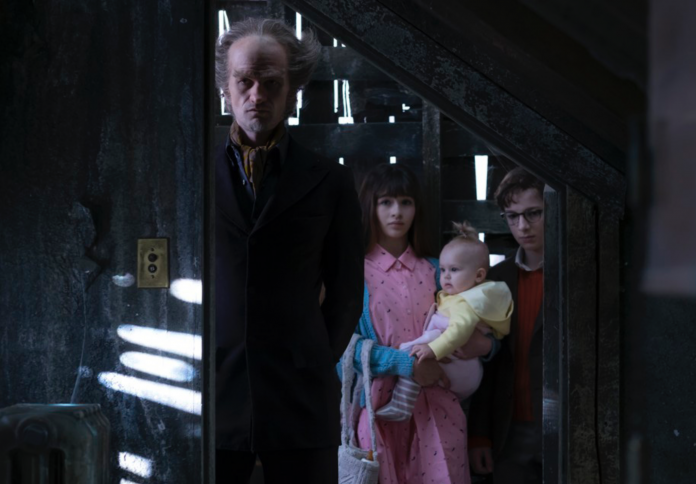I never read Lemony Snicket’s A Series of Unfortunate Events novels as a kid. A bunch of my friends did, so I sort of got the gist of the plot through them. Three orphan kids are adopted by the evil Count Olaf (which, I mean, come on, obviously we’re meant to assume he’s oafish) and are subjected to, well, a series of horrible events.
The Netflix original series sees us accompany Violet, Klaus, and Sunny Baudelaire as they attempt to navigate the tyranny of foster care, forever hounded by Count Olaf, a man after their apparently huge inheritance.
The series is handled with a grimly humorous tongue-in-cheek through the vehicle of Lemony Snicket (a character played by Patrick Warburton) narrating the children’s misfortune. The three children, however, are all deftly equipped to deal with the inept foes that try to ensnare them throughout. Violet, the oldest Baudelaire, has a knack for mechanics and problem-solving; Klaus, her brother, is a bookish boy who has a seemingly endless wealth of literary knowledge; and Sunny, their infant sister, has very sharp teeth, which she uses to bite through ropes, rocks, and wood as well as carve out objects for her siblings’ use, like keys.
I can see why the story is appealing, and for a children’s audience it must have been ground-breaking in its decidedly depressive take on the subject, but, as a television show geared towards a larger range of audiences, it doesn’t quite stack up.
There are three reasons for this.
The first is Neil Patrick Harris.
Harris is lovely. He can sing. He’s a good comedy actor. He is, I imagine, a marketer’s wet dream: appealing to virtually every demographic. He’s not a villain though. Particularly not in this series, because although he often does have villainous monologues, and the colour palate does scream “This is the bad guy!” he just doesn’t act the part. He doesn’t commit.
He’s either the most incompetent villain ever created (something the Baudelaires point out often), or he’s just not that bad. We’re told he’s bad, though, often and repeatedly, which makes it jarring when his behaviour doesn’t quite stack up to the evilness of his overt description.
The same goes for K. Todd Freeman’s character of Arthur Poe, a banker. He is just as incompetent a social worker as Olaf is a villain. Always bumbling and flustered, the man never seems to get anything right, even when the Baudelaires (seeing through the fog of deception) tell him straight-up, “Hey, there’s a psychopath following us intent on taking our fortune.”
It could be funny if it was satire. But it’s not really, since the narrative never goes deeply enough into any topic other than the transplanting of the Baudelaires from one foster family to another.
Where does this leave us? With a series that’s kind of unfortunate but only in the sense that, after a whole season, I don’t really care about any of these characters.
Olaf will always be incompetent, Violet will always be crafty and inventive, Klaus will always have a literary reference at the ready, and Mr. Poe will forever be clueless.
There are also many sub-plots which are uninteresting, only because they’re executed with the same kind of nonchalant air of the main plot, and never really go anywhere.
Maybe the final episode will wrap things up nicely, but I don’t have high hopes.


